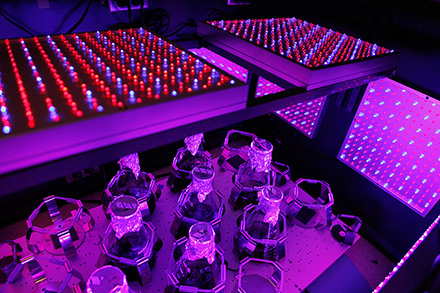
Our Research Focus
The Graduate Program in Biochemistry and Biophysics offers advanced education in the principles and practice of macromolecular chemistry, mechanism, and structure. All aspects of this program are aimed at the question: how do macromolecules work? How do proteins, membranes, nucleic acids, membrane assemblies, and high-order complexes of these enormous molecules use physical-chemical principles to act in the varied contexts that underlie biological function?
Faculty participating in this program share the conviction that the coherent operation of living cells, and its disruption in disease, is ultimately understandable in terms of the chemistry and physics of biological macromolecules.
Our Students
This highly multidisciplinary program draws students from two types of undergraduate backgrounds: those with more chemically-based training (Chemistry, Biochemistry, Biology majors) and those from Physics, Engineering, or Mathematics, who wish to bring quantitative skills to bear upon biological problems. This student mix is meant to be mutually reinforcing, so that during the trajectory to the PhD degree, all trainees master both chemical and quantitative approaches to the art of macromolecular analysis. The program offers:
- a rigorous curriculum of courses emphasizing macromolecular structure and function
- four student-selected laboratory rotations during the first academic year
- original thesis research in laboratories operating on the edge of discovery
- practice in conveying scientific information via expository writing and public speaking
- specialized informal seminars, discussion-groups, and journal-clubs
- opportunities to present research results at professional scientific meetings
